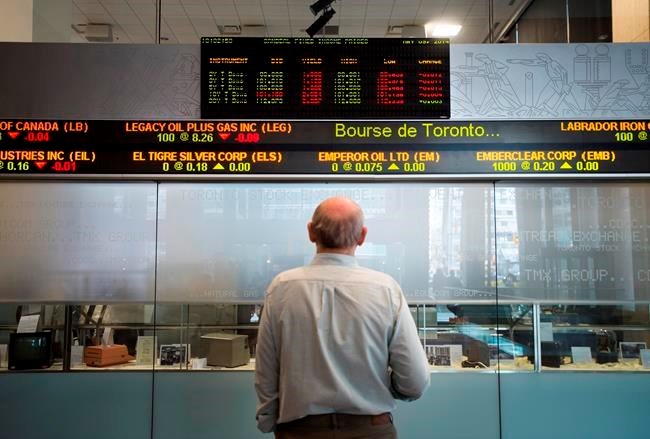TORONTO — North American stock markets fell to end a volatile week on the impact of OPEC failing to reach a deal to cut oil output along with continued worries about the novel coronavirus outbreak.
Markets rallied near closing from deep losses in earlier trading to end the week not far from where they started.
"We've had these huge runs up and huge runs down to end up nowhere," said Colin Cieszynski, chief market strategist at SIA Wealth Management. "Not quite on the treadmill but it's more like being on a roller coaster."
The S&P/TSX composite index closed down 378.97 points at 16,175.02. That's just 88 points below where they ended last Friday after hitting an intraday low of 16,015.81.
U.S. markets ended the week slightly positive even as the Dow Jones industrial average was down 256.50 points Friday to 25,864.78. The S&P 500 index was down 51.57 points at 2,972.37, while the Nasdaq composite was down 162.98 points at 8,575.62.
Markets faced ongoing pressure from COVID-19 as the number of cases around the world in more than 80 countries surpassed 100,000 as new cases were disclosed in North America.
The real pressure on the TSX, in particular, came from the energy sector, which was down 6.6 per cent on the day as crude oil prices sank 10 per cent to their lowest level since August 2016.
"It's just gone off a cliff this year and we haven't seen these kind of selloffs probably since the financial crisis of '08," Cieszynski said in an interview.
Oil took a hit after Russia rejected a proposal by Saudi Arabia for OPEC+ to cut a total of 1.5 million barrels per day to relieve some of the demand pressure from the virus.
"Not only were they not able to come to an agreement on a cut but they weren't even able to agree on extending the current cuts, so I think that's pretty much depressed the oil market," he said.
The April crude contract was down US$4.62 at US$41.28 per barrel and the April natural gas contract was down 6.4 cents at US$1.71 per mmBTU. That pushed Husky Energy Inc., Crescent Point Energy Corp. down 12.5 and 12.1 per cent respectively.
Gold prices gained 6.7 per cent for the week to reach their highest level in more than seven years. However, the gains weren't enough to offset the large drop in the key energy sector.
The April gold contract was up US$4.40 at US$1,672.40 an ounce to help Barrick Gold Corp., whose shares gained 3.2 per cent. The May copper contract was down 1.25 cents at US$2.56 a pound.
All 11 major sectors on the TSX were down, lead by energy, health care and technology. Health care fell as shares of several cannabis producers plummeted with Aurora Cannabis Inc. down 11.9 per cent and Canopy Growth Corp. off 8.8 per cent.
Technology was driven lower by Lightspeed POS Inc. and Shopify Inc.
National Bank lost six per cent to push the heavyweight financials sector lower as bond yields fell, with the U.S. 10-year treasury sinking to a new low below 0.7 per cent before closing slightly above that level.
"The capital that's coming out of stocks and the capital that's coming out of commodities like crude oil is looking for the defensive havens. It's plowing into gold and it's really plowing into bonds," said Cieszynski.
The Canadian dollar traded for 74.51 cents US compared with an average of 74.54 cents US on Thursday.
The stock markets' continued declines overshadowed strong jobs reports indicating that 30,300 new jobs were added in Canada last month and 273,000 in the United States.
"All the stars were lining up for this to be a fantastic year for the world economy until coronavirus hit, which is really too bad because job growth was going well, U.S. and China had settled their trade war and this has thrown a huge monkey wrench into everything."
This report by The Canadian Press was first published March 6, 2020.
Companies in this story: (TSX:HSE, TSX:CPG, TSX:ABX, TSX:ACB, TSX:WEED, TSX:LSPD, TSX:SHOP, TSX:NA, TSX:GSPTSE, TSX:CADUSD=X)
Ross Marowits, The Canadian Press



